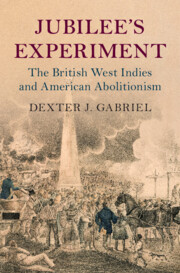Refine search
Actions for selected content:
34 results
5 - Separate Independence in Other Settings
-
- Book:
- Fueling Sovereignty
- Published online:
- 14 March 2024
- Print publication:
- 21 March 2024, pp 138-157
-
- Chapter
- Export citation
3 - The Dutch Empire
- from Part I - Imperial and Postcolonial Settings
-
-
- Book:
- The Cambridge History of Nationhood and Nationalism
- Published online:
- 08 November 2023
- Print publication:
- 09 November 2023, pp 43-63
-
- Chapter
- Export citation
Chapter 17 - Voices Lost?
-
- Book:
- Staël, Romanticism and Revolution
- Published online:
- 03 August 2023
- Print publication:
- 17 August 2023, pp 200-211
-
- Chapter
-
- You have access
- Open access
- HTML
- Export citation
Epilogue
-
- Book:
- Jubilee's Experiment
- Published online:
- 30 March 2023
- Print publication:
- 06 April 2023, pp 327-336
-
- Chapter
- Export citation
1 - The Anxieties of Emancipation
-
- Book:
- Jubilee's Experiment
- Published online:
- 30 March 2023
- Print publication:
- 06 April 2023, pp 16-39
-
- Chapter
- Export citation
5 - The Experiment and Its Challenges
-
- Book:
- Jubilee's Experiment
- Published online:
- 30 March 2023
- Print publication:
- 06 April 2023, pp 164-194
-
- Chapter
- Export citation
Introduction
-
- Book:
- Jubilee's Experiment
- Published online:
- 30 March 2023
- Print publication:
- 06 April 2023, pp 1-15
-
- Chapter
- Export citation
8 - A West Indian Jubilee in America
-
- Book:
- Jubilee's Experiment
- Published online:
- 30 March 2023
- Print publication:
- 06 April 2023, pp 282-326
-
- Chapter
- Export citation
3 - The Benefits of Free Labor
-
- Book:
- Jubilee's Experiment
- Published online:
- 30 March 2023
- Print publication:
- 06 April 2023, pp 85-124
-
- Chapter
- Export citation
7 - African Americans and British Emancipation
-
- Book:
- Jubilee's Experiment
- Published online:
- 30 March 2023
- Print publication:
- 06 April 2023, pp 238-281
-
- Chapter
- Export citation
6 - Reform and the Experiment
-
- Book:
- Jubilee's Experiment
- Published online:
- 30 March 2023
- Print publication:
- 06 April 2023, pp 195-237
-
- Chapter
- Export citation
4 - The Problems of Apprenticeship
-
- Book:
- Jubilee's Experiment
- Published online:
- 30 March 2023
- Print publication:
- 06 April 2023, pp 125-163
-
- Chapter
- Export citation

Jubilee's Experiment
- The British West Indies and American Abolitionism
-
- Published online:
- 30 March 2023
- Print publication:
- 06 April 2023
9 - The British Army
- from Part II - The State of the Armed Forces
-
-
- Book:
- The Cambridge History of the Napoleonic Wars
- Published online:
- 20 December 2022
- Print publication:
- 02 March 2023, pp 170-189
-
- Chapter
- Export citation
6 - Imperial Welcome: The British Subject
- from Part II - Registers
-
- Book:
- Untied Kingdom
- Published online:
- 16 February 2023
- Print publication:
- 16 February 2023, pp 159-193
-
- Chapter
- Export citation
8 - Pride in the Goods: The Moral Economy of the Common Market
- from Part II - Registers
-
- Book:
- Untied Kingdom
- Published online:
- 16 February 2023
- Print publication:
- 16 February 2023, pp 227-255
-
- Chapter
- Export citation
22 - On the West Indies: Address of Dr. W. E. B. Du Bois at the St. Thomas Chamber of Commerce (1952)
-
- Book:
- W. E. B. Du Bois: International Thought
- Published online:
- 10 November 2022
- Print publication:
- 17 November 2022, pp 256-260
-
- Chapter
- Export citation
Chapter 3 - The Black-White Gentleman
-
- Book:
- Shakespeare and British World War Two Film
- Published online:
- 24 March 2022
- Print publication:
- 31 March 2022, pp 96-135
-
- Chapter
- Export citation
5 - Free Trade versus Free Labour
- from Part I - Mapping Humanitarianism
-
- Book:
- Protecting the Empire's Humanity
- Published online:
- 14 September 2021
- Print publication:
- 23 September 2021, pp 137-172
-
- Chapter
- Export citation
Looking for Agency in Transnational Refugee Trajectories during the Second World War
-
- Journal:
- Itinerario / Volume 45 / Issue 1 / April 2021
- Published online by Cambridge University Press:
- 31 March 2021, pp. 174-187
-
- Article
-
- You have access
- Open access
- HTML
- Export citation
